- Home
- entertainment
- news
- The 15 most shocking film twists of the last 30 years
The 15 most shocking film twists of the last 30 years
Eammon Jacobs

- Warning: Major spoilers ahead for each film on the list.
- The landscape of Hollywood has drastically changed in the last 30 years.
"Goodnight Mommy" (2014)
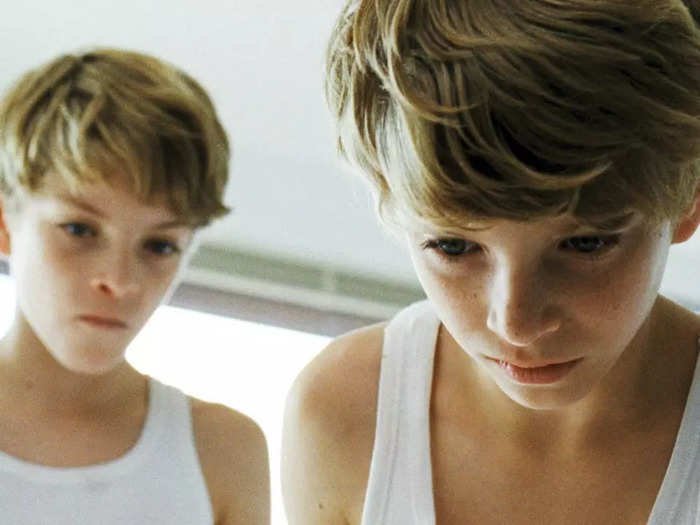
Kicking off the list is the grim 2014 psychological horror from directors Veronika Franz and Severin Fala, and it follows twins Elias (Elias Schwarz) and Lukas (Lukas Schwarz) as they start to believe their mother has been replaced by a different woman after she has facial surgery.
The twins start to hold the woman hostage in the house so she can't hurt them, accidentally torturing her in the process by sealing her lips with glue and then cutting them open with scissors when they realize she can't eat. It's an effective way of flipping generic horror tropes, but it only gets more disturbing at the end.
Elias and Lukas glue the woman to the floor, and start to burn the house down to try and get her to confess that she isn't their real mother. Unfortunately, she screams that she'll pretend Lukas is still alive.
Yes, Lukas has been dead for the whole film as Elias has Capgras delusion and refuses to accept that his brother drowned. This also confirms that Elias has been torturing his own mother for the sake of it, and the haunting ending clearly implies that they both die in the fire. It's a pretty bleak ending, but it's definitely shocking.
"Moon" (2009)
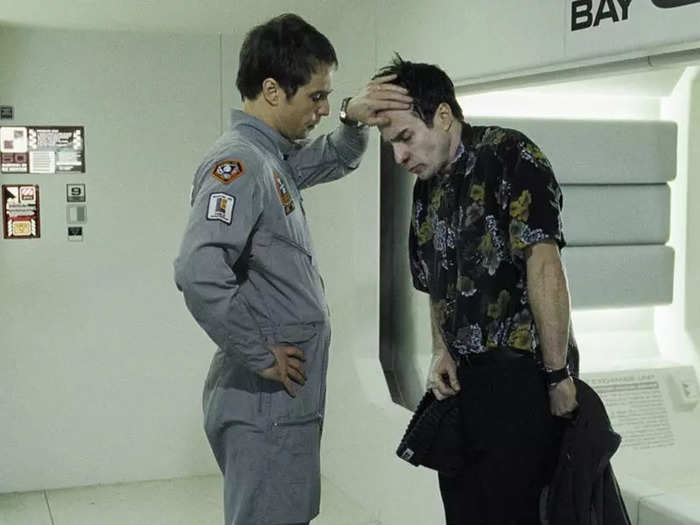
Duncan Jones' "Moon" is set in a dystopian future where a company called Lunar Industries is mining a revolutionary new fuel on the moon's surface. But most of the machinery is operated by automated A.I. GERTY (Kevin Spacey), which means only one astronaut is needed to keep the place running.
Sam Bell (Sam Rockwell) is coming to the end of his three-year contract on the moon and is desperate to get home, but the film delivers a surprising twist: he's just the latest in a long line of clones of the original Sam Bell.
Yes, the shady corporation has resorted to human cloning to get out of training more staff to keep their operating costs down. It's a brilliant twist from the director, who also wrote the story, and Rockwell perfectly sells the shock and horror in his performance.
"Parasite" (2019)
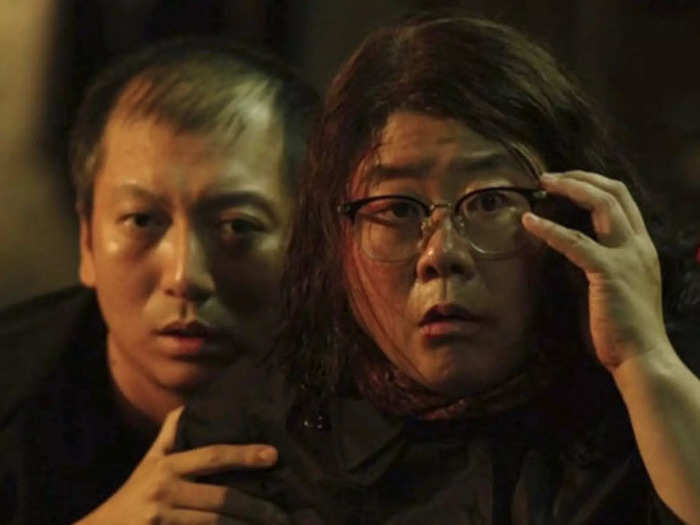
Oh, "Parasite," you delightfully twisted little beast.
There's a good reason Bong Joon-ho's 2019 movie won best picture at the Oscars, and it all comes down to that stunning twist one hour in.
The film is all about the class divide in Seoul, mainly as one destitute family tries to scheme their way into jobs working for a wealthy family in their mansion. Yes, they're leeching off the rich upper-class citizens, but they're not the only ones.
After getting the housekeeper, Gook Moon-gwang (Lee Jung-eun), fired, the family learns that her husband, Oh Geun-sae (Park Myung-hoon), has actually been living in the bowels of the large house.
And after a struggle, the family stops Moon-gwang from warning her former employers about what they're up to by pushing her down the stairs into the secret basement.
Unfortunately, she dies slowly, which enrages Geun-sae, who becomes unhinged in the shocking finale. It has to be seen to be believed, but it's one of Joon-ho's finest films.
"The Prestige" (2006)
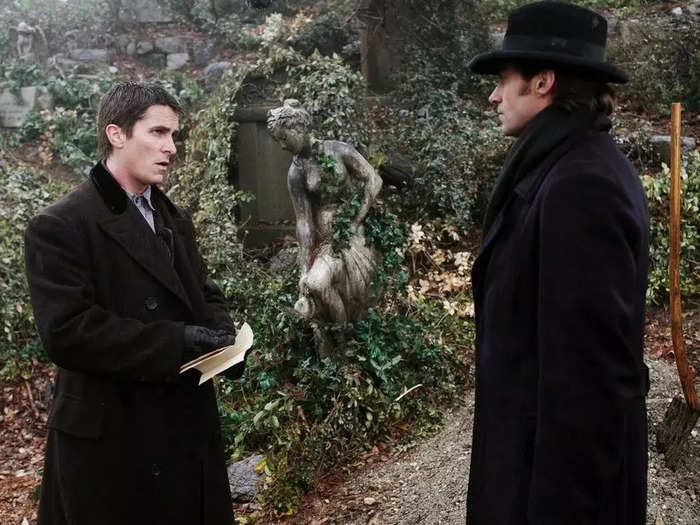
The Christopher Nolan film follows Robert Angier (Hugh Jackman) and Alfred Borden (Christian Bale), two warring magicians at the end of the 19th century who turn to bizarre methods to beat each other. But the film is really about dual identities.
For Borden, the surprise is that he's actually a twin and he and his twin took turns playing the magician, while the other masqueraded as the assistant, Fallon. Their whole lives have been dedicated to creating one solid identity. Imagine!
But Angier's desperation to beat his rival pushes him to use experimental technology built by Nikola Tesla (David Bowie). Although it teleports Angier across the stage in a magical explosion of lightning and smoke, it also creates a perfect clone of the magician.
Although it looks astounding, it's never clear whether it was the clone who was transported across the room, or the original version of Angier. What's even more shocking is that to make sure his secret was safe, the magician engineered a trap door underneath the stage so that one of them would fall into a tank of water and drown.
So, who was it at the end? The real Robert Angier? Or a clone? It's probably a good thing Borden leaves him to die under the burning stage.
"Fight Club" (1999)
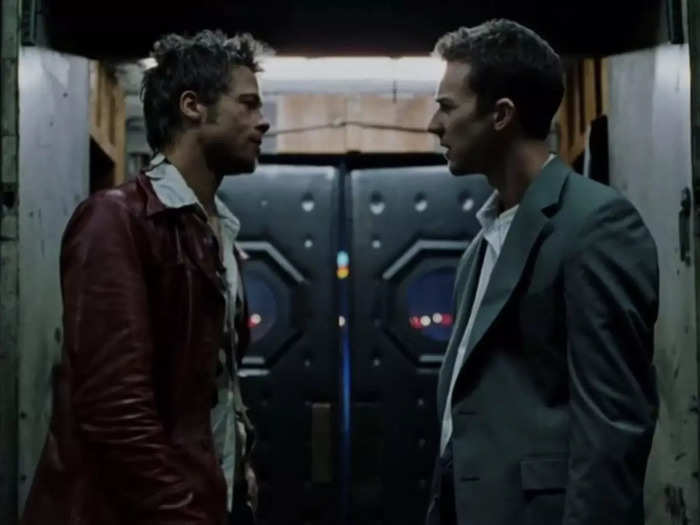
Okay sure, Tyler Durden (Brad Pitt) being a figment of the narrator's (Edward Norton) imagination in "Fight Club" feels like a predictable, boring trope now, but at the time it was a shocking revelation that pulled the rug out from under the audience's feet.
The twist itself works a treat because "Fight Club" baits audiences into thinking this is just a straightforward thriller about a man trying to take control of his life.
Of course, Brad Pitt's chiseled abs couldn't be real! He's supposed to be the ideal man, that's why he's just oozing charisma and swagger.
Admittedly, the story about disenfranchised young men plotting terrorist attacks to change society doesn't sit well in the present day. But it's hard to deny David Fincher brought such a unique flair to Chuck Palahniuk's story about the dangers of toxic masculinity.
"Seven" (1995)
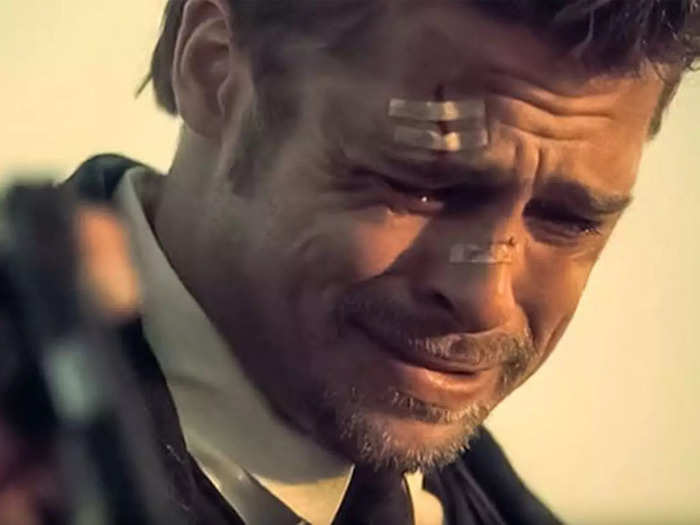
David Fincher's second entry on the list is the serial killer thriller, "Seven," which sees Detective Somerset (Morgan Freeman) and Detective Mills (Brad Pitt) track down a man killing people by punishing them for each of the seven deadly sins.
Each crime scene they stumble upon is a twisted tableau of horrors orchestrated by John Doe (Kevin Spacey), who is determined to rage at society itself. The ending works so well, because amongst the eternal rain of the nameless city, and the grim crime scenes, there are moments of hope for Mills and his wife Tracey (Gwyneth Paltrow).
But Doe's schemes involve toying with the young detective by pushing him to become the final sin, wrath, after decapitating Tracey's head and mailing it to a remote location that he's led the police to.
The finale is pretty bleak, as Mills understandably shoots Doe repeatedly in revenge for his wife's death. Typical thrillers like this end on a hopeful beat, with the heroes solving the crime and putting the bad guy behind bars.
But Doe wins in the end by turning Mills into wrath and fulfilling his mission. Yikes.
"Split" (2016)
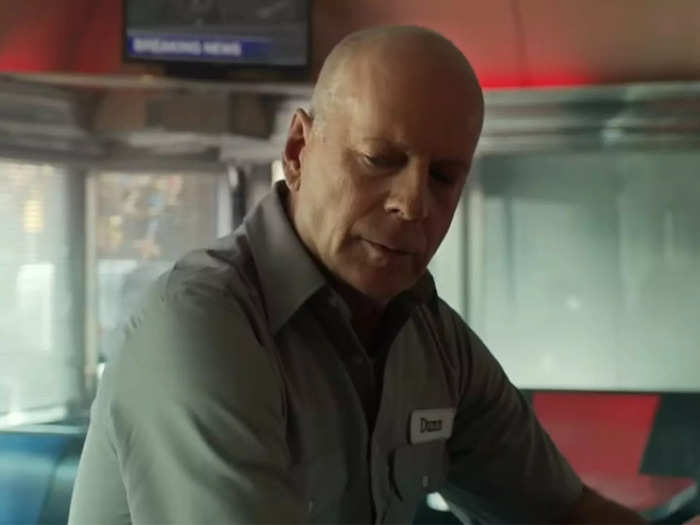
Night Shyamalan's "Split" is an excellently tense thriller, as Kevin Wendell Crumb (James McAvoy) kidnaps three girls and locks them underground. He has dissociative identity disorder, and he holds a number of unique identities inside his brain, and they're all preparing for the arrival of another violent personality to emerge.
Although the film mainly focuses on Casey (Anya Taylor-Joy) and her fight to escape from Kevin, "Split" ends with the surprising revelation that this takes place in the same world as M. Night Shyamalan's 2000 movie, "Unbreakable."
Yes, Bruce Willis returns as David Dunn, the man who emerged from a devastating train wreck thanks to his super strength and invulnerability. It's a genuine surprise that works because Shyamalan's never done a sequel to one of his own movies before, and "Split" felt self-contained until that point.
Shyamalan later returned to explore this world further for a third time with 2019's "Glass."
"Predestination" (2014)
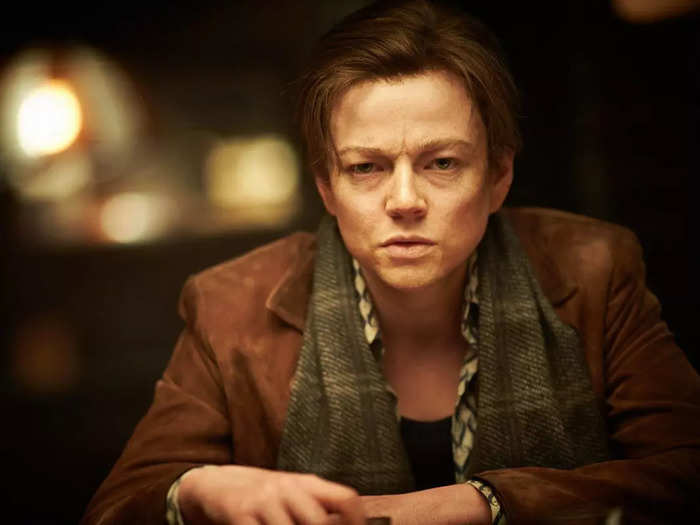
2014's "Predestination" is one of the most surprising and confusing science-fiction movies of the last few decades, and it's led by powerhouse performances from "Succession" star Sarah Snook and Ethan Hawke.
Snook plays Jane, a young woman who falls in love with a mysterious stranger and has his baby, before undergoing gender reassignment surgery after a traumatic birth revealed that she was intersex.
She transitions into John, and becomes a mildly successful writer. This is all while Ethan Hawke's Agent Doe works for the time-traveling Temporal Bureau to stop an unhinged serial bomber in the 1970s.
It all gets very complicated thanks to multiple timelines and different perspectives, but stay with us! The ending explains that Jane, John, their child, and the serial bomber are all the same person. This is all because John's boss at the bureau, Mr. Robertson (Noah Taylor), has been experimenting with a "predestination paradox."
So yes: Jane gives birth to herself, the father is John who had traveled back in time, and an older version of John who has had facial reconstruction kidnaps the child and takes her back into the past, leaving her at an orphanage.
The "Fizzle Bomber" is an even older version of John who has become disillusioned with time travel and is supposedly preventing even bigger catastrophes with his well-placed explosions.
Time travel, it's confusing, but what a twist!
"The Sixth Sense" (1999)
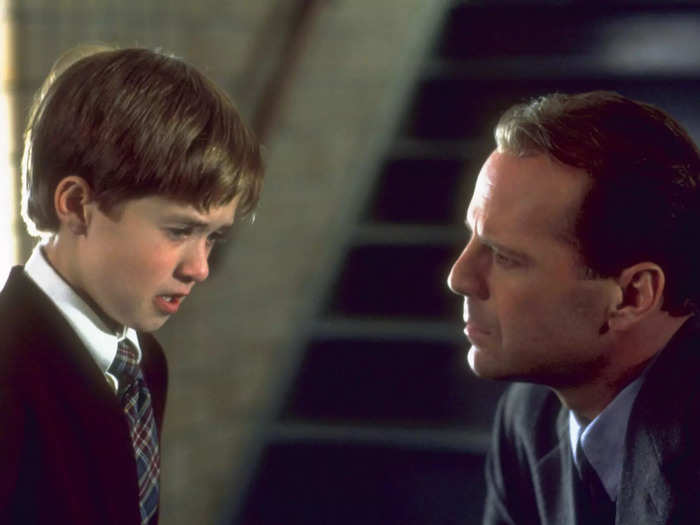
There's no denying that M. Night Shyamalan is the master of delivering a surprising twist in his movies, and "The Sixth Sense" is the best of them all. It follows Bruce Willis' psychologist Malcolm Crowe who works with a young boy, Cole Sear (Haley Joel Osmont), who believes that he can talk to the dead.
While the story is so focused on the adults in the movie confronting the fact that Cole can genuinely communicate with ghosts, Shyamalan masterfully pulls the rug out from the audience by revealing that Malcolm has been dead the entire time.
Yes, he actually died in the movie's dramatic opening when he gets shot by a former patient, Vincent (Donnie Wahlberg). The reveal is well hidden thanks to Malcolm's profession as a psychologist, so viewers are lulled into thinking that's why he's talking to Cole, and not because he's actually a ghost.
But yes, it's funny that even in death Malcolm still went to work. Poor guy.
"Knives Out" (2019)

"Star Wars: The Last Jedi" director Rian Johnson surprised audiences in 2019 with his star-studded whodunnit, "Knives Out." It sees private detective Benoit Blanc (Daniel Craig) investigate the death of wealthy author Harlan Thrombey (Christopher Plummer) in his sprawling mansion.
Johnson recruited the likes of Jamie Lee Curtis, Don Johnson, LaKeith Stanfield, Michael Shannon Ana de Armas, and more into his sharply written murder mystery.
But the standout role arguably goes to Harlan's estranged grandchild, Ransom Thrombey (Chris Evans), who is eventually revealed as the real reason behind Harlan's death.
After finding out that the elderly writer was going to leave the family empire to his nurse, Marta (Ana de Armas) in his will, Ransom swapped the labels on his grandfather's medication in an attempt to kill him via an overdose.
Harlan committed suicide to avoid getting Marta into trouble, which sets off plenty of shenanigans for Benoit to unravel. Ultimately, it's surprising that Evans' character is the killer because let's face it, who expects Captain America himself to be a devilish murderer?
"Get Out" (2017)
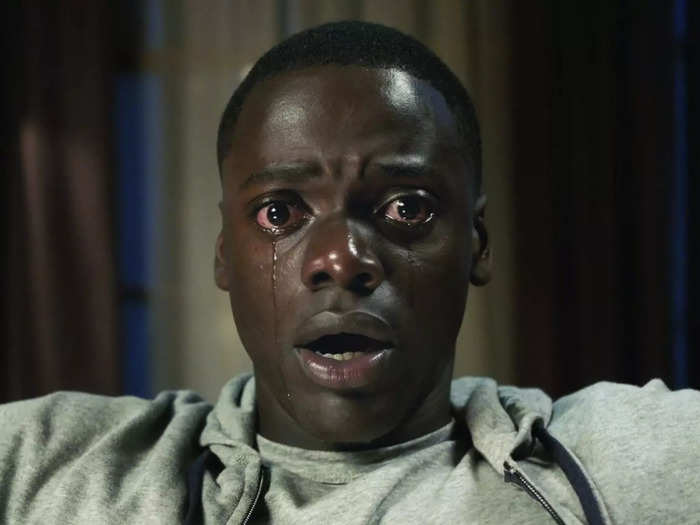
While Jordan Peele's career was based in comedy, with shows like "Mad TV and "Key & Peele," he shifted his focus onto horror in 2017 with "Get Out." It follows Chris (Daniel Kaluuya), who visits his white girlfriend's family for the first time only to realize that something is very, very wrong.
For a while, it looks like this is just a sharp social satire of white dominance in America, but Peele goes much further than that. Aside from his biting commentary on how black people are treated by supposedly liberal people, he uses a jaw-dropping reveal to hammer it home.
Chris discovers that the Armitage family has been using hypnosis to trap young black men and women in their own subconscious (called the "Sunken Place") to let aging white people take over their bodies to gain the benefits of their youth and a form of immortality.
There are so many layers to how horrifying that concept is, and it's impressive that Peele managed to pull off such a complex idea for his directorial debut.
"Arrival" (2016)

French Canadian director Denis Villeneuve just knows how to bring powerful, dramatic science fiction to the big screen with movies like "Blade Runner 2049," and "Dune." But his most powerful work in the genre is definitely 2016's "Arrival," starring Amy Adams as linguist Louise Banks and Jeremy Renner as physicist Ian Donnelly.
The film starts with the heartbreaking death of Banks' daughter, before jumping into the story as a number of spaceships arrive on Earth, hovering over different continents. Banks and Donnelly are recruited to try and figure out a way of communicating with the aliens, dubbed "heptapods" because of their several limbs.
It's incredibly difficult to set up a method of communication, but eventually, Banks realizes that the alien language changes her perception of time itself — and she has premonitions of giving birth to her daughter, who is destined to die due to a disease.
The moment that Banks and the audience realize that the film's devastating opening is actually set in the future is a total gut-punch, because it means Banks already knows the trajectory of her life.
Her daughter will die, and Donnelly will break up with her because he can't cope with the grief. Can someone pass the tissues?
"Shutter Island" (2010)
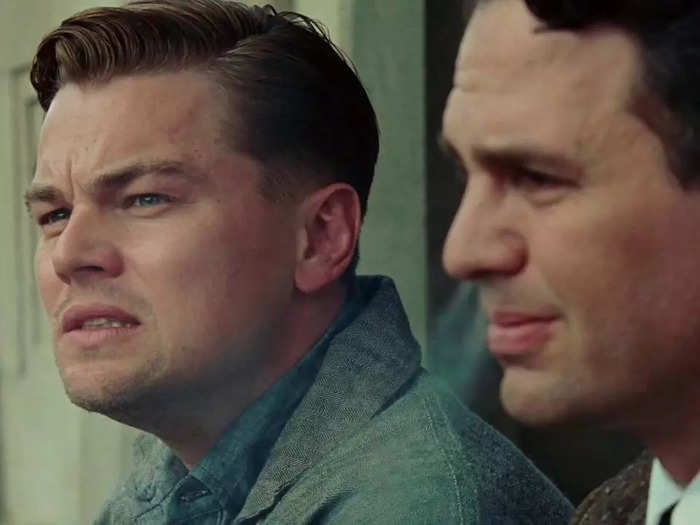
Martin Scorsese's "Shutter Island" is an intricate mystery based on US marshal Teddy Daniels (Leonardo DiCaprio), who's investigating the disappearance of a patient in a psychiatric facility on the titular island.
Unfortunately, Daniels' own traumatic past during World War II, and the death of his wife (Michelle Williams), continues to haunt him on the island — pushing him to the brink of his own sanity.
Although the story gets a little bit messy at times, the juicy twist makes it all so satisfying. The entire mystery has been fabricated by the staff in the facility as a way of trying to get Teddy Daniels to confront his true identity: Andrew Laeddis.
This revelation makes the patient confront the fact that he murdered his own wife after she drowned their children… It's a tragic reveal, which is only made worse by Andrew's reluctance to accept the truth. It's an emotional ending, especially since he's taken off to be lobotomized in the film's final moments.
"Inglourious Basterds" (2009)
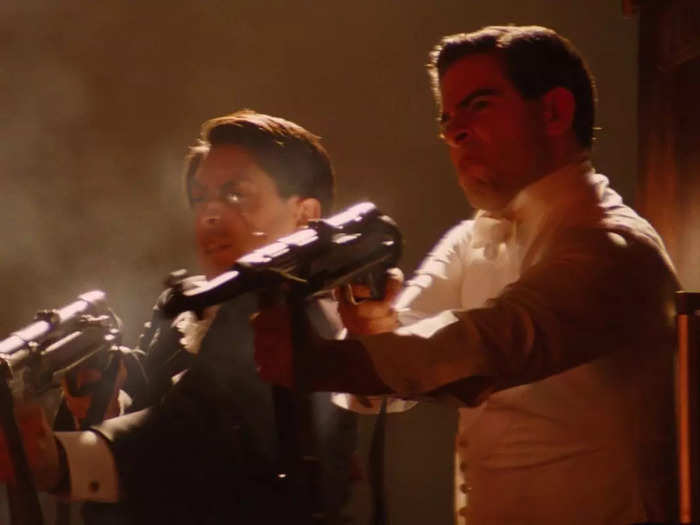
Quentin Tarantino has always reveled in shocking audiences with his hyper-violent adventures that pay homage to grindhouse movies of the 1970s and 1980s, but he ramps the chaos up a notch with "Inglourious Basterds."
The premise is simple: Lt. Aldo Raine (Brad Pitt) and his band of U.S. soldiers drop behind enemy lines in World War II to scalp as many Nazis as possible, while Jewish theater owner Shosanna Dreyfus (Melanie Laurent) plots a revenge plan of her own.
But when the two plots collide in an explosive finale, Tarantino rewrites history by having Sergeant Donny Donowitz (Eli Roth) execute Adolf Hitler (Martin Wuttke) with a machine gun.
Obviously, this revises history as we know it, so it's definitely surprising. Maybe that's why everyone in Tarantino's movies is obsessed with death! Learning about American soldiers scalping Nazis and obliterating Hitler in a hail of bullets could definitely desensitize an entire generation.
"Gone Girl" (2014)
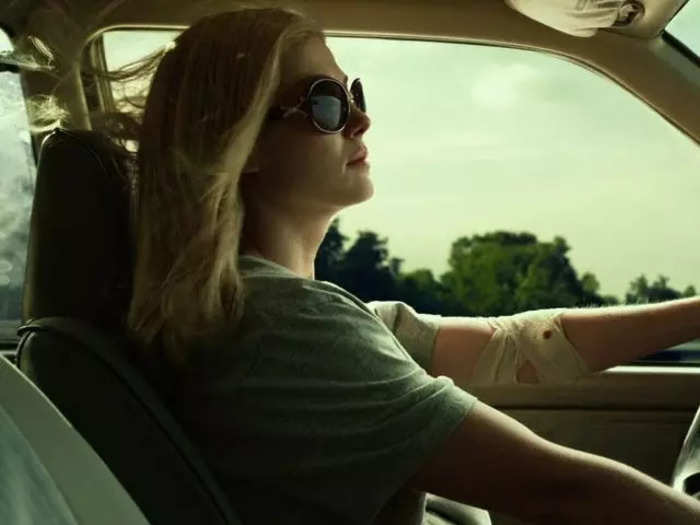
Gillian Flynn's "Gone Girl" got the big screen treatment in 2014 from David Fincher, with Ben Affleck and Rosamund Pike generating intense chemistry as Nick and Amy Elliot Dunne. It follows Nick as he tries to uncover the truth behind his wife's disappearance from their quiet neighborhood in the middle of their marital troubles.
Although for a while, it looks like she might've been kidnapped, or worse, the film's big twist shows that Amy has faked her own abduction because she's sick of Nick's behavior and unfaithfulness.
Her whole twisted scheme is designed to get Nick to fight for the truth about their marriage in the public eye, transforming them into the ultimate power couple.
But that moment at the midway point where Amy is living life how she likes is nothing short of fascinating, and that's all down to Pike's ice-cold narration.
Popular Right Now
Popular Keywords
Advertisement